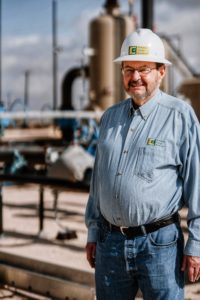
Autry Stephens
After a career spanning almost 60 years, in which he founded several companies and mentored many individuals in the business, Endeavor Energy Resources LP founder Autry Stephens will be honored as the PBPA’s Top Hand for 2021. In 2018 the Dallas Morning News called Endeavor “the largest closely held oil producer in Texas by production volume.”
Big Dog Drilling, founded in 1996, is one of several other companies Stephens has opened in his long career.
Over the years Stephens has worked for the oil company then known as Humble [now ExxonMobil] and the bank then known as First National Bank of Midland (now part of Bank of America) before launching out on his own in the late 1970s. Previous to founding Endeavor in 1979, Stephens launched a consulting business, with less-than-stellar results. Getting fired by his main client was something he recalls as “devastating” at the time, but in retrospect was “probably the best thing that ever happened to me.”
He continued, “At that point I became an independent, which is a euphemism for ‘unemployed.’”
Shortly after that he drilled a single well, founded Endeavor, and began the long process of changing the meaning of “independent” to coincide with “visionary entrepreneur.”
Stephens’s road to that point began on a DeLeon-area farm, with the assumption that the young Stephens would accede to the family trade upon adulthood. The fact that “I wasn’t a very good farmer” allowed him to entertain alternative career options.
A major drought in his high school graduation year of 1956 prompted Stephens’s father to advise him, “You know, farming is a hard way to make a living—maybe you should consider something else.”
Taking the hint, Stephens began thinking about petroleum engineering because he’d read that people in those professions worked in exotic locations like Venezuela, Saudi Arabia, and Malaysia. Even though he says he doesn’t really have an engineering mind, the call of the world lured him into getting such a degree from UT.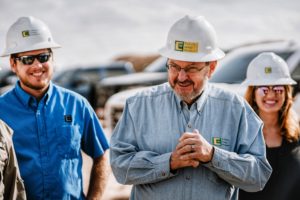
After two years in the military, his first job with Humble was in Pecos—far from the romance of Maracaibo or Riyadh. At least the military sent him to France, outside of Paris.
A few years with Humble helped him realize that, although he loved the company, he was not meshing with the corporate structure. He did learn much about the company’s then state-of-the-art drilling and production technology, doing some reservoir engineering and production work while in the company’s employ.
During that time he was also sent to Midland, to Abilene, and back to Midland. On his second Midland stint in 1969 he was approached by First National Bank to do oil and gas property appraisals. Most of the people he worked with were small independents, giving him insight into the inner workings of independents that would serve him well with the founding of Endeavor.
After ten years with the bank, his opportunity for self-employment arose when he was approached by a bank client asking him to become a consultant for them. In that role he would do an annual reserve report for them for an upcoming IPO, then repeat that report annually thereafter.
“That was heady business for a young engineer, to get the evaluation and the IPO—the owners were worth $50 million each.”
Unfortunately, the gig didn’t last long, as there was a dispute over Stephens’s evaluation of the reserves on a particular property. Declaring that he wouldn’t back down on his assessment, the company fired him. Such was the incident he looked back upon as “probably the best thing that ever happened to me.”
A New Beginning
Having availed himself of the bank’s permission for employees to invest their own money in opportunities, the newly unemployed Stephens did have some income to see him through the transition. Plus, he’d picked up another consulting client.
But he was looking for bigger fish to fry. “Even before I left the bank I’d had ideas of being independent and doing my own thing. I had acreage in mind to lease.”
Right after leaving the bank he’d bought an 80-acre lease near Greenwood, drilling his first well in 1979 in the Spraberry Trend. Sinking his life savings into that hole, it made a “modest well. I wouldn’t recommend that to anyone,” he noted. He also owned joint interest in some other wells.
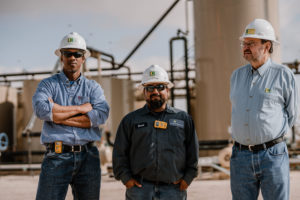 The next year he drilled two wells, the year after that four. “I had a business plan that I’d like to buy producing properties that had an upside for these properties to be worked over, or to do some additional drilling.”
The next year he drilled two wells, the year after that four. “I had a business plan that I’d like to buy producing properties that had an upside for these properties to be worked over, or to do some additional drilling.”
Referring to his slow but steady growth as stability, Stephens notes that he’s been in the same office building since the day he left the bank. Almost everything else has changed in the business, from commodity prices to financing, but Endeavor’s careful approach has allowed it to grow into a leadership position among independents in the nation.
This “engineer who doesn’t think like an engineer” says he sees most in that genre as “calm, logical, reasoned, good in math—and I was probably none of those things.” Math was difficult, but he’d been trained to do whatever was necessary so he worked hard in math in order to be successful.
Engineers are trained to “find the problem, gather your data, and do the modeling and process.” He says his mind “jumps around” more than a typical engineer’s mind would.
While stability is important, Stephens understands that it must be balanced with adaptability, a key requirement for the energy business in current environments. The guy who “thought he would die if I was trapped in an office” now says he’s spent 99 percent of his time in that very office—leading to his “adaptability” lesson.
“The main things that I saw in global events is that OPEC has taken over control of oil prices,” he said. The beginning of that shift came with the organization’s oil embargo in 1973 that overnight shot oil prices from $3 per barrel to $12.
Technology, horizontal drilling, multi-stage fracturing, shale plays, 3-D seismic to pinpoint smaller targets—“these are the things that I saw develop.” He’d been taught in early ’60s university classes that shale was not productive, only a potential problem if a company drilled through it. Now, of course, new techniques allowed those formations to fuel a huge production boom in recent years.
Stephens says he learned much about the business and about management from a number of his early-career supervisors, but no single one stands out. From some of them he says he learned what to do and from others he learned what not to do.
Successes
Over his lifetime, Stephens is most pleased with “building a company and building stable employment for a lot of people.”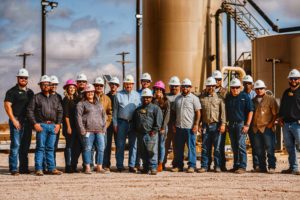
His biggest business accomplishment—which he labels a “coup”—was the 2005 acquisition of the U.S. assets of the French company Perenco. “It was a lot of money that we were able to raise from the banks and pull it off against better-financed competitors—I would call it a coup.” Perenco, with production in multiple countries, was divesting its U.S. assets at the time. Stephens said it boosted Endeavor’s production by around 30 percent.
The Future
The aforementioned adaptability is at the top of Stephens’s “futures” list. Realizing that the oil and gas business is not going anywhere anytime soon, it yet will be engulfed in tumultuous change. The rise of electric vehicles is a concern in that arena.
On the other hand, rumors of the industry’s death are not new. “People have been predicting that we would run out of oil and gas 100 years ago. I think the industry can help itself by lowering emissions—carbon dioxide, methane especially.” He reports that Endeavor is more environmentally conscious, increasing emission control efforts especially in the last year. Since the industry has “ a lot of smart people” he is confident solutions can be found.
What Others Say
While it’s been noted that Stephens learned much from many people in the industry over the years, those who work with Stephens list the man himself as an inspiration.
Endeavor’s General Counsel, Michael Short, says “Autry’s tireless work ethic has been an inspiration to me and many others. Over the past 40 years, he has purposefully put together a world-class resource base likely to never be duplicated in the oil and gas business. This is an accomplishment he should rightfully be proud of.
“Autry’s commitment to Midland and the greater Permian Basin has influenced generations.”
Chuck Meloy, Endeavor board member (and former CEO): “Autry is one of the most persistent people I have ever met. He was committed to the Spraberry Trend from the beginning. He created an amazing asset by sticking to his beliefs and staying while many left. I have great admiration for his vision and legacy as a Midland oilman.”
CEO Lance Robertson alludes to the adaptability Stephens touts: “I have had the opportunity to work with Autry at Endeavor for five years now. During this time Endeavor has been on a remarkable journey of rebirth in pursuit of our mission to be a top tier horizontal operator in the Permian Basin known for growth, teamwork, and financial discipline. Our team has enjoyed tremendous success, growing from 24,000 boepd production in early 2017 to a year end of 230,000 boepd in 2021. Along the way we have had many adjustments and changes as a team and individuals to deliver the company its current position.
“For Endeavor to transform from its vertically focused past to the modern horizontal development of today has been at the heart of the efforts these past few years.This transformation has required many changes and adaptations across the company. Our processes, workflows, and team have all materially updated to meet the needs of today. We have reorganized our structure, implemented new software, and effectively left no stone unturned in pursuit of progress. Throughout this time, Autry has patiently allowed others to help Endeavor reach these successes. As you can imagine, there have been many discussions and difficult decisions involved to drive Endeavor forward.
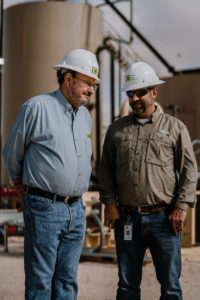 “Having founded and led Endeavor since its inception, Autry brings a long career of experiences to our boardroom. I have come to appreciate how these experiences through the cycles position him to be calm and secure when faced with challenges. During the late spring of 2020, as the coronavirus epidemic unfolded, commodity markets faced a contraction without historical analog. Oil demand contracted 10 percent for the year and more than 30 percent in the second quarter. During these tumultuous days where the depth and duration of the down cycle was opaque, Autry was sanguine. He remarked that our balance sheet had never been better and, though a challenging time, he recalled earlier downturns feeling far worse [to him]. When faced with a truly daunting time, Autry looked through his lifetime and remained confident that our actions to limit, spend, and preserve our balance sheet would see us to a better tomorrow as a company. His experiences through many cycles of the energy business had prepared him well for another.”
“Having founded and led Endeavor since its inception, Autry brings a long career of experiences to our boardroom. I have come to appreciate how these experiences through the cycles position him to be calm and secure when faced with challenges. During the late spring of 2020, as the coronavirus epidemic unfolded, commodity markets faced a contraction without historical analog. Oil demand contracted 10 percent for the year and more than 30 percent in the second quarter. During these tumultuous days where the depth and duration of the down cycle was opaque, Autry was sanguine. He remarked that our balance sheet had never been better and, though a challenging time, he recalled earlier downturns feeling far worse [to him]. When faced with a truly daunting time, Autry looked through his lifetime and remained confident that our actions to limit, spend, and preserve our balance sheet would see us to a better tomorrow as a company. His experiences through many cycles of the energy business had prepared him well for another.”
Finally, Stephens’s daughter and company board member Lyndal Greth: “What I admire and appreciate most about my dad is his unconditional love of his family, his incredible work ethic, his calculated risk-taking skills, and his dedication to Endeavor. No one will out-work him, and he’s always seeking to learn more. He’s an incredible example, and I’m truly blessed to be his daughter.”
_________________________________________________________________________________________________
By Paul Wiseman










